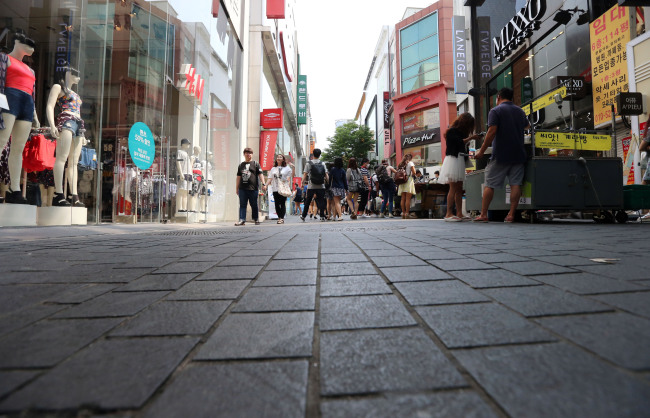 |
Myeong-dong, a popular tourist destination in Seoul, is quieter than usual Sunday. (Yonhap) |
As the Middle East respiratory syndrome continues to scare away tourists, the Korean government has come up with a desperate measure to lure them back: free, full-coverage MERS insurance to foreign visitors.
The scheme, announced Monday along with other emergency measures to support the MERS-hit local tourism, is a show of confidence in the country’s ongoing efforts to contain the potentially deadly virus that has been so far confined to hospitals, Seoul officials said.
“This is an unprecedented measure and it is more to show people how safe Korea really is,” Kim Jong, vice minister of the Ministry of Culture, Sports and Tourism, told reporters at a press conference.
According to the ministry, foreign tourists arriving at Korea starting June 22 will be automatically covered by a special MERS insurance product, currently under development by a local insurance company. The insurance policy will cover all MERS-related medical costs and traveling expenditures and carry cash benefits of $3,000 for MERS infection and about $90,000 for MERS-related death.
As of press time Monday, Korea has 150 confirmed cases, 16 deaths and more than 5,000 people under quarantine in the largest MERS outbreak outside the Middle East.
As of June 12, over 100,000 foreign vacationers had canceled their trips to Korea, mostly from China and Hong Kong, according to the state-run Korea Tourism Organization.
“The (virus’) impact (on tourism) may grow bigger in July and August, the peak vacation season,” Kim explained.
The envisioned MERS insurance is part of a set of emergency measures announced Monday to aid the tourism sector.
A total of 71 billion won ($64 million) will be provided in soft loans to travel agencies, hotels and other private companies in the industry to help them tide over temporary financial difficulties stemming from mass cancellations and a sharp drop in tourists.
To boost domestic tourism, the ministry seeks to encourage Korean workers to take summer vacations in June.
“We’re also encouraging festival organizers not to cancel or delay their events and to push ahead with their schedules,” Kim said.
By Lee Sun-young (
milaya@heraldcorp.com)








![[Weekender] Korea's traditional sauce culture gains global recognition](http://res.heraldm.com/phpwas/restmb_idxmake.php?idx=644&simg=/content/image/2024/11/21/20241121050153_0.jpg)